Kazakh Beverages: Basic Overview
Common Ingredients
Common Preparing Methods
Drinking Etiquette
Influence and Fusion
Kazakh Beverages: Origin and Region
Cuisine
Culinary Region
Country’s Region
Classifications of Kazakh Beverages
-
Alcoholic Beverages
Kazakhstan’s alcoholic beverages range from domestically produced beers to wines.
Traditional fermented drinks with minimal alcohol content, such as kumis, made from fermented mare’s milk, also play a cultural role, particularly in social and ceremonial contexts.
-
Non-alcoholic Beverages
Non-alcoholic beverages in Kazakhstan include a variety of drinks without ethanol content, ranging from hot drinks like tea to sweet, fruit-based preparations.
These beverages are a part of daily life, providing refreshments and playing an important part in hospitality and social gatherings.
Kazakh beverages are a part of Kazakhstan’s culinary heritage, reflecting the nation’s nomadic history. These beverages range from traditional teas to unique fermented drinks and play vital roles in daily life and ceremonial practices.
Common among these is tea, particularly black tea, consumed throughout the day and offered to guests as a sign of hospitality. In addition to tea, Kazakhstan, like its other Central Asian neighbors, is known for its variety of dairy-based drinks, which are rooted in the pastoral lifestyle of its people.
These traditional drinks not only provide insights into Kazakh culture and traditions but also continue to be a source of national pride and communal identity.
After going through the beverages, you can check out the dishes that go well with these drinks in Kazakhstan.
10 Best Kazakh Beverages
Uncover the 10 refreshments available in Kazakhstan, utilizing the handy filter system to view these options according to their ingredients, taste, popularity, preparation methods, and other features.
Butter Tea
- Non-Alcoholic
- Traditional
Butter tea is a warming beverage commonly enjoyed in Kazakhstan along with the Himalayan regions across Asia. The tea blend combines black tea with butter and salt, creating a creamy and energizing drink.
This tea is often consumed to provide sustenance in cold climates or during long work hours. While not native to Kazakh cuisine, butter tea is popular with the Nomad population thanks to the availability of milk and butter.
Kazakh Wine
- Alcoholic
- National
Kazakh wine is produced in Kazakhstan with a rich history dating back to the 7th century AD. The industry began when grapevines were introduced to the region, now encompassing around 32,120 acres in southern Kazakhstan.
On average, Kazakhstan produces over 6.2 million gallons of wine annually. While Kazakhstan consumes a significant amount of wine, about 80% is imported due to local production constraints and preferences for sweet red wines.
Kompot
- Non-Alcoholic
- Traditional
Kompot is a traditional refreshment popular in Kazakhstan and throughout Eastern Europe. The fruity mix is a sweet drink created by simmering fresh fruits such as apples, cherries, strawberries, or peaches in a large quantity of water with sugar.
Often consumed chilled, kompot offers a refreshing taste and is particularly favored during the hot summer months. In Kazakhstan, kompot is a staple in many households, cherished for its ability to preserve the flavor of summer fruits throughout the year.
Nauryz Kozhe
- Non-Alcoholic
- Traditional
Nauryz kozhe is a unique Kazakh drink specially prepared for Nauryz, the Persian New Year celebrated in Kazakhstan to mark the spring equinox.
This exotic concoction mainly consists of salt, horse meat, kashk, milk, and grains like wheat or barley. Aside from being a drink, nauryz kozhe is even served as a meal for the locals.
Ayran
- Non-Alcoholic
- Traditional
Ayran is a refreshing drink highly valued among all the Kazakh nomads and Turkic peoples. This simple beverage was historically essential during long horseback journeys, often serving as the primary sustenance.
Ayran is made by boiling various types of milk and then cooling it slightly before adding a fermentation starter. The mixture is vigorously shaken and left to rest for 2-3 hours, during which it thickens and develops its unique flavor.
Ideally, ayran should be consumed within a day of preparation to retain its best property.
Ayran is one of the common drink options in Tajikistan as well, reflecting the shared nomadic heritage and traditions across these countries.
Kumis
- Alcoholic
- Traditional
Kumis is a traditional fermented milk beverage native to Kazakhstan, made primarily from mare’s milk. The white liquid has a unique, slightly alcoholic, and tangy flavor from the fermentation process.
This light drink has up to 40 different varieties with many preparation methods. Kumis are special in Kazakh culture, often consumed during social gatherings and celebrations.
Shubat
- Non-Alcoholic
- Traditional
Shubat is a traditional Kazakh drink made from fermented camel’s milk. The preparation involves adding a starter to a fresh camel’s milk and allowing it to ferment in a dark place using traditional containers like leather wineskins or ceramic vessels.
After fermenting for several days, the milk is stirred to achieve a thick, creamy consistency. Shubat is known to support digestive health and enhance skin resilience against harsh climates, similar to age-old beverage practices found in Middle Eastern cultures.
Kazakh Beer
- Alcoholic
- National
Kazakh beer is an alcoholic beverage featuring both local and international influences.
The breweries in Kazakhstan, such as those operated by the Efes Beverage Group and Carlsberg Group in cities like Karaganda and Almaty, as well as the independent Shymkentpivo in Shymkent, produce beers that vary from rich and robust to light and refreshing.
Katyk
- Non-Alcoholic
- Traditional
Katyk is another fermented milk drink from Kazakhstan, known for its creamy texture and mild flavor. This traditional beverage comes in a unique two-step fermentation process.
Initially, baked milk is mixed with ferments and left in a warm place for 6-8 hours to ferment. In the second stage, the product from the first fermentation is added to new milk and allowed to mature for another day, developing its rich taste.
Katyk is also beloved among beverages in Kyrgyzstan, with each country having its own traditional recipes and fermentation processes.
Kazakh Chai
- Non-Alcoholic
- Traditional
Kazakh chai is a term that refers to all types of tea in Kazakhstan, consumed at every meal and on all occasions. Traditionally, Kazakhs drink black tea in winter and switch to green tea in the summer, often served in small bowls.
Drinking black tea is a cultural ceremony; guests are welcomed with a ‘syi-ayak,’ a partially filled cup of tea, and the host’s readiness for immediate refills.
In Kazakhstan, black tea is enhanced with milk and sugar, while in some regions, shirchay is a favorable pick for enjoying a meal that includes ingredients like salt, milk, butter, flour, and even fried tail fat. Tea culture in Kazakhstan is also influenced by beverage traditions from Russia and Iran.
What Kazakh Dishes to Have with Drinks?
These are a few popular combos of Kazakh specialties to have with beverages from the country.

Baursak
Enjoy with sweet tea or kumis; these deep-fried dough balls are light and airy, making them a great snack.
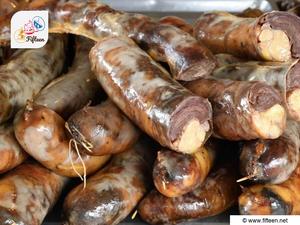
Qazı
Serve with strong black tea or ayran; this horse meat sausage is rich and flavorful, ideal for hearty appetites.
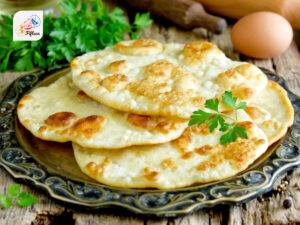
Shelpek
Pair with ayran or tea; these flatbreads are simple and satisfying, complementing both sweet and savory beverages.
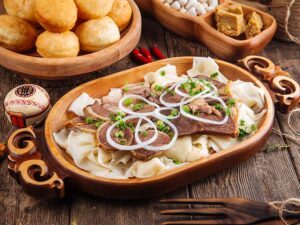
Beshbarmak
Best with shubat or black tea, this traditional meat and noodle dish is hearty and requires a drink that can cleanse the palate.
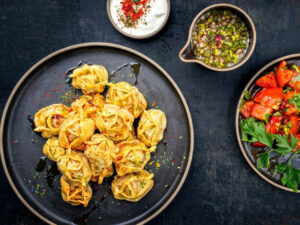
Manti
Enjoy with a glass of ayran; these dumplings are filled with meat, making them ideal with a yogurt-based drink to balance the richness.
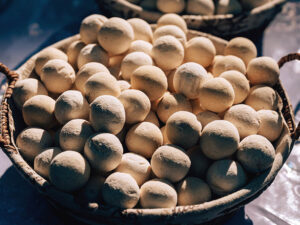
Kurt
Pair with black tea; these salty dried cheese balls are intense in flavor and go well with a simple, strong tea.
Don’t forget to drop your opinions about Kazkh drinks in the comment section to share your unique drinking experience. Share these exotic drinks from Kazakhstan with others so they can uncover the cuisine of the country.





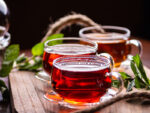


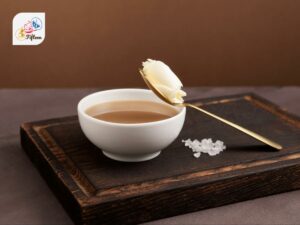

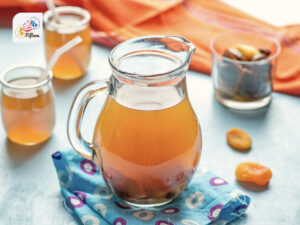


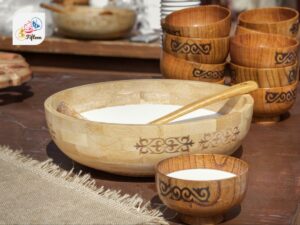
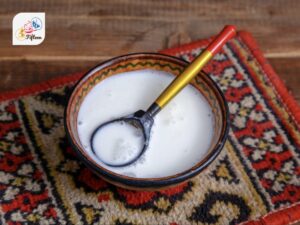
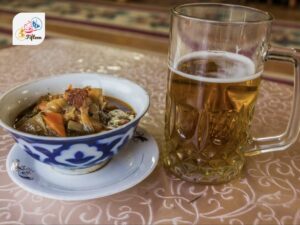
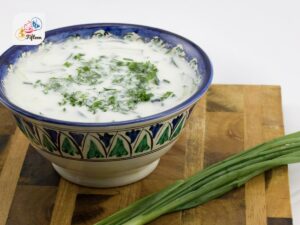
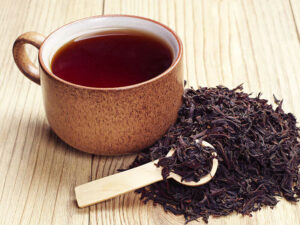
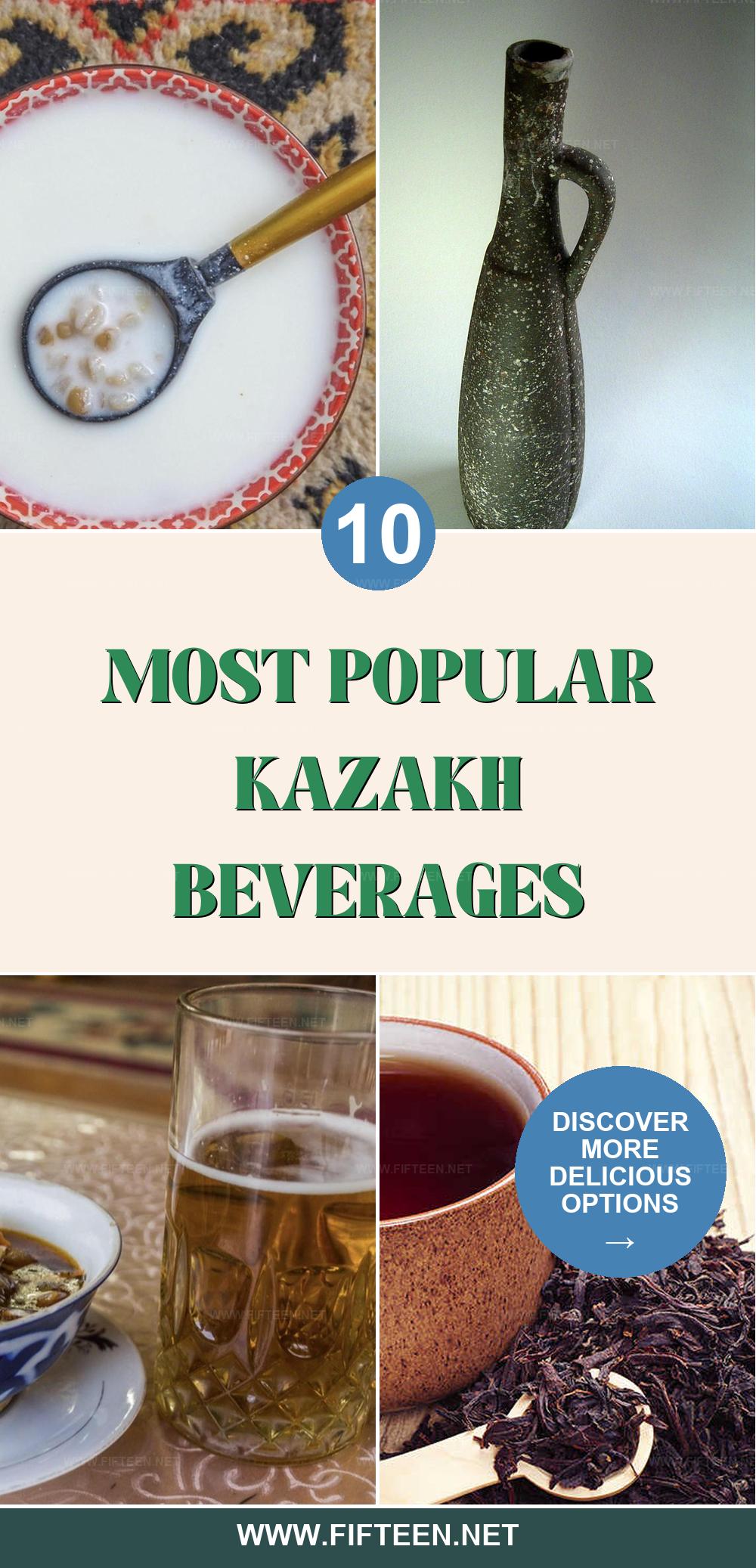
Jamie Scott
Editor in Chief, Senior Content Writer
Expertise
Home Cooking, Meal Planning, Recipe Development, Baking and Pastry, Food Editor, Cooking-video Maker, Western Food Evaluation Expert
Education
Le Cordon Bleu College of Culinary Arts
Local Community College, New York, NY
Jamie Scott is a skilled culinary expert and content creator specializing in Western cuisine. With over 15 years in the culinary field and formal training from Le Cordon Bleu, Paris, Jamie deeply understands how to blend nutrition with delicious flavors. His passion for cooking matches his commitment to making healthy eating accessible and enjoyable.
On Fifteen.net, Jamie brings a fresh perspective to classic dishes and beverages, offering readers insightful recipes, cooking tips, and a fresh view on meal planning that emphasizes taste, health, and simplicity.